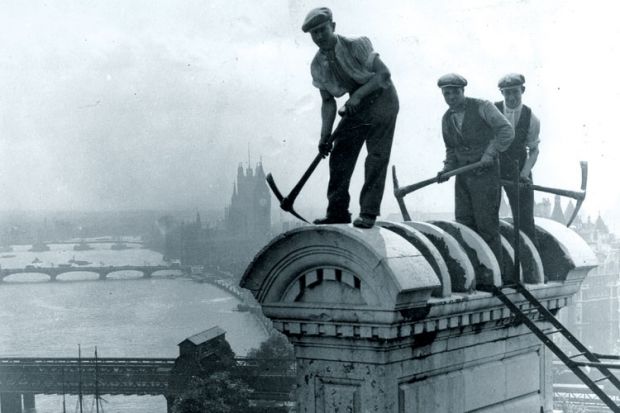Source: Getty
Philip Larkin’s remark that we had never had sex before 1963 is questionable, but it is a certainty that we had never had a history like this
When Jeremy Paxman asked “Who wrote The Making of the English Working Class?” in the semi-finals of this year’s University Challenge and nobody knew, I was roused into writing this piece. These kids knew Practically Everything about Everything but they did not know, and I bet they still do not know, that E. P. Thompson was Britain’s greatest post-war historian and the book’s author.
Thompson wrote The Making of the English Working Class in late 1950s Halifax, a very different England from the one we live in now, with a manufacturing population still living in its industrial heartlands, and still in touch with its collective traditions. Inspired by his encounters in the West Riding, the young staff tutor in university adult education threw himself into its history. At a time when he was writing against nearly everything else in his life, educating Yorkshire gave him something to write for. The Making never left anyone in doubt about the ability of a Marxist to love his country. This flagrantly revolutionary book brought a whole new set of players on to the national stage (most of the English people, as it happens) and by making the argument that in making themselves they saved their country, its author brought them centre stage and front.
Although he was a former member of the Communist Party Historians Group, Thompson was just as interested in the people’s Englishness as he was in their class consciousness. He saw the “working class” not just as factors of production, as the political economists had it; nor as life’s “victims”, the usual socialist epithet; nor as the “masses”, a very 1950s idea; still less as a “hegemonised bloc” or a proletariat marching blankly into the future. On the contrary, he saw them as freeborn Englishmen, with a history and a will of their own. And although according to this most charismatic of historians nearly all of them were men, they were not simple working-class heroes either, but did things, and believed things – as Methodists or mobs, pagans or papists, strike-breakers or chauvinists, wife-sellers or overlookers – that were not entirely to his liking. In other words, Thompson tried, sometimes against the grain, to write about the English people as he found them.
Philip Larkin’s remark that we had never had sex before 1963 is questionable, but it is an absolute certainty that we had never had a history like this. While Karl Marx was a bit of a lad – and a bourgeois lad at that – Thompson saw the English working class as engaged in a life-or-death fight with the bourgeoisie and their intellectual allies. There was a sense in which the 20-year-old Thompson, like his contemporary Ralph Miliband, did not like (for the Daily Mail’s sake let’s say “hated”) aspects of this country, but during the war that did not stop him from volunteering as soon as he could, and sweating it out in the Royal Tank Regiment all through North Africa and Italy. Men of his stamp didn’t talk about it much, but for them fighting for their country was inseparable from loving it and loving it from wanting to change it.

The English (sometimes British) working class had made brief appearances in the writing of history before, but never like this and never with such spirit. After a very obedient biography of William Morris in 1955, Thompson left the Communist Party in 1956 to grow into a combative historian who in the quality of his writing increasingly saw what he wanted to see. The Making was the high cultural version of 1950s English New Left thinking. He did not just offer a history of weavers and wheelwrights, preachers and poets, but drew imaginatively on a wider range of sources (The Leeds Mercury to Home Office files, religious tracts to William Cobbett’s Two-Penny Trash) and concentrated his fire on such a tight arc of questions to do with life and identity that English history was never, could never be, the same again. Historians talk about “paradigm shifts” and compete with one another to claim them. Edward Thompson would never have competed for his research excellence framework gold star. He would have resigned his university tutorship rather than do that. But in its day his book was the biggest paradigm-shifter of the lot.
I bought my first copy in 1968 – a small, fat bundle of Pelican with a picture of a Yorkshire miner on the front – and I still have it, bandaged up and exhausted by the years of labour. From the first of its 900-odd pages, I knew, and my friends at the University of Sussex knew, that this was something else. We talked about it in the bar and on the bus and in the refectory queue. Imagine that: young male students more interested in a book than in gooseberry tart and custard. Back home, the printer of bingo cards in South Shields at that time was called Edward Thompson. Waiting for the call, I wondered whether our Edward, the historian Edward, for all his devotions, had ever sat, heart pounding in Leeds for Two Fat Ladies and Legs Eleven. Probably not. Thompson was not the first Oxbridge-educated patrician to love the workers but not their sport. Mark Mazower remembers Eric Hobsbawm’s “characteristic barked interrogative” (“not really a first-class mind what?”) – and Thompson takes his place along with Hobsbawm and Christopher Hill and others in the Marxist apostolic succession so lovingly remembered in the pages of The Guardian by the MP and historian Tristram Hunt.
So The Making was special and this is its golden anniversary year. For this reason, if for no other, it deserves our attention. But there are three other reasons.

That the classic history of the Industrial Revolution should be forgotten is a mistake. It’s all gender, ethnic, ‘other’ and global history now
First, students aren’t being taught this kind of history any more. When I left the University of Leicester last year, in a superb School of History comprising more than 30 staff, I think I was the only person teaching it directly. That the classic history of the Industrial Revolution – not just E. P. Thompson but all the great founders of social history – should be so quickly forgotten is a mistake. It’s all gender, ethnic, “other” and global history these days as Marxists have de-Marxified and taken their struggles elsewhere. “Class” as a great organising concept has all but left the academy (although of course it hasn’t left the history).
Second, the book still has the power to educate, not least in its fundamental belief that people make their own lives albeit, as Marx reasoned, not in conditions of their own choosing. In the end, the rich and powerful have to negotiate with the poor and property-less. That is how our society has worked anyhow. Thompson called for the end of “the enormous condescension of posterity”. In the late 19th century the ones condescended to were the croppers and handloom weavers and all those who fought the Industrial Revolution and lost (just about everybody up to 1900). In 1963, these people were all but gone, and Thompson wrote about them with miners and steelworkers in mind. In our day, the miners and steelworkers are all but gone and the condescension to them is all too apparent. To misquote our man, we must “rescue the redundant Welsh steelworker, the Dagenham female shop steward, the ‘obsolete’ shipyard driller, the ‘utopian’ co-operator, and even the deluded follower of Arthur Scargill from the enormous condescension of posterity. Their crafts may have been dying. Their hostility to globalisation may have been backward looking. Their brotherly arguments may have been narrow. But they fought to defend their culture and we did not.”
And then there are today’s workers: the Tesco shelf-stacker, the benefit trap mother, the minimum-wage carer, the poor deluded follower of Imam Choudary. I once taught a mature student who loved this book. It taught her about Bradford where she had worked in a factory, and about her native Pakistan where her parents had worked in the fields. Hello? Come in Mr Gove. Would you agree there is work to be done here? At the very least we might discuss whether “class” continues to be worth discussing in the national curriculum even though it has all but disappeared from the national conversation. If you want long English narratives with plenty of living tradition, local colour and high drama, then Fatima is your witness.

The third reason for celebrating Thompson’s book lies not with his subject but with him. The committed left-winger was a new kind of historian in British universities. Thompson took his subject, it did not take him. But that’s not to say it’s a perfect book. In it, there are too few women, almost no domestic servants, too much Yorkshire (and London), too few statistics (none), too much spite (towards Methodism in particular) and not enough undergirding of the roughest arguments. Some historians have argued that all round his timing was wrong; that it’s too soon to talk about an industrial working class in the 1830s. Thompson’s politics seem dated too. In 1967 the Robbins report universities seemed perfect places for new hope in higher education. That hope is now long broken on the rack of privatisation, just as the living working-class traditions that inspired him have, too, since been broken in nearly every bone. His key subjects – white working-class men – are probably the most forgotten and ill-considered class in contemporary Britain.
To really understand Thompson you have to understand that he wanted to be on the side of the people. And unless you have actually tried to do that, through thin and thin as it were, you will not know what a strange position it is. He was never entirely at ease with his subjects. He over-intellectualises their world and is never comfortable with its more emotional, maleficent side. Another difficulty is their common decency – so difficult to prove and, like their patriotism, never easy for the English Left. Simple left-right, Guardian-Mail dichotomies do not work either; Thompson’s people were as conservative as they were radical. In their furious battle with a class that would turn all England into a market or a workhouse, they were as much concerned with what was being lost as what could be gained.
E. P. Thompson believed that the English working class was in the making by the 1830s, embedded by the 1890s, central by the 1940s and at the post-industrial crossroads by the 1960s. And because he was a Leavisite as much as he was a Marxist, he stitched his arguments, as far as he could, into the words of the people and their very English writers. When referring to Edward Thompson, semi-finalists of 2013 University Challenge please note: Cheltenham Chartists were chaired by an old blacksmith and – “One night…somebody spoke of Tom Paine. Up jumped the chairman. ‘I will not sit in the chair,’ he cried in great wrath, ‘and hear that great man reviled. Bear in mind he was not a prize-fighter. There is no such person as Tom Paine. Mister Thomas Paine if you please!’ ”
Register to continue
Why register?
- Registration is free and only takes a moment
- Once registered, you can read 3 articles a month
- Sign up for our newsletter
Subscribe
Or subscribe for unlimited access to:
- Unlimited access to news, views, insights & reviews
- Digital editions
- Digital access to THE’s university and college rankings analysis
Already registered or a current subscriber? Login




